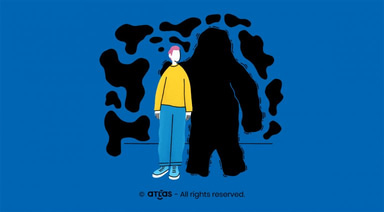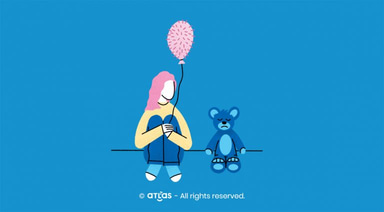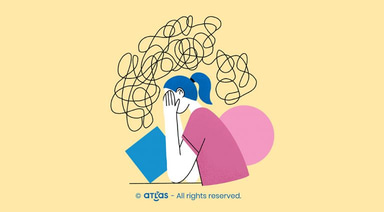Have you ever wondered what it’s like with the European motto: united in diversity? What about European diversity in the Covid-19 unit? How does all this translate into what specialists call a psychological profile? Under the pressure of these times we are living, how similar or different are we when it comes to emotional profile?
Sounds like a cliché? However, it looks like we know as a people, to draw the narrow circle, whenever danger lurks. This pandemic without a passport, it takes us to the board to respond promptly to emotions without having learned the full lesson.
What lesson? The one that is written by our soul right on the back of the notebook. It happens to others, too, regardless of nationality or geographical, emotional ‘positioning.’
Are you wondering how your neighbour from the third floor feels? But how’s your neighbour from another country?
The pretty lady who sells souvenirs (admit you have a few magnets, just yours on the fridge :)), in Venice, corner with San Marco? Your Spanish neighbour on vacation, who was in a hurry to say hello first, whenever you went to complete your Jamon and Tinto de Verano stock? What’s the cute older man from the tiny fish store in Thassos doing? He closed his shop. But maybe his fear can’t pull the shutters. Just like you, he makes his soul clump with anxiety sometimes.
We are now drawing the hopscotch and moving attention from the tight circle to all forms of European emotion.
Psychological profile made in Romania
Regarding the psychological profile of the Romanian people, a study led over several years and published in 2015 (Psychology of the Romanian people. The psychological profile of Romanians in a cognitive-experimental monograph, Polirom Publishing House, Iaşi), shows that Romanians are:
- cynics and sceptics;
- creative and intelligent.
That just said briefly:)
We also become conformists in some situations, but unruly in others. Does that sound familiar? This indiscipline brings us closer sometimes through a Latin effervescence, to Italian, and Spanish.
They can also be concerned about the other’s well being only if they are part of their family, and the defensive side sometimes leads them to certain complexes. Whereas Spaniards, Portuguese, and Italians, for example, pay more attention to the wellbeing of people around them, always saying that if others are well, they will be so. And you can see that, right? Whenever you interact with them, you feel a lack of individualism.
Think a little bit about ?, still about pandemic!
Experts say that the perfect people do not even exist in ideal situations but in such situations of European and global crises?
They also tell us that we are the ones who move most easily from one emotion to another with pronounced extraversion in crisis situations. We can also oscillate as:
- affective flexibility in human relationships;
- affective instability and reduced autonomy;
- emotional addiction, especially during this period.
How we are and how we think we are
The level of positive emotions is lower in Romanians and the level of negative emotions higher compared to countries in western Europe.
The study of Daniel David, professor at Babes-Bolyai University in Cluj-Napoca and associate professor of the Icahn School of Medicine at Mount Sinai, New York, USA (after another study conducted a century ago by Professor Constantin Rădulescu-Motru – “Psychology of the Romanian people”) talks about the Romanian people compared to other peoples:
The Romanians were examined in this study compared to the Spanish, Italians, and Germans (but also with the Americans or Indians), speaking of an individualism specific to the Romanian as the main feature, not a social and economic one specific to the peoples of the west.
How much of this :
- pleasantness,
- extraversion,
- psychological,
- openness,
- conscientiousness,
- and specific neuroticism,
…are found in other people?
We seem to be much more adaptable than most of the peoples of Europe.
Instead, the difference between how we are as a personality and how we believe we are is much more significant than in western Europe.
We are skeptical of various things compared to Germany, Turkey, or America.
Daniel David, professor at the “Babeş-Bolyai” University of Cluj-Napoca, mentioned in the paper mentioned above:
Romania has no greater psychological problems than other Western countries but has an existential dissatisfaction expressed by negative, dominant emotions and a lower level of happiness than in other countries. This dissatisfaction also comes from multiple discrepancies, but also from a negative self-esteem that, instead of confronting and changing, we deny/mitigate or compensate. To reduce the stress of these differences, we turn to defensive mechanisms, which makes us reactive to criticism.
At ATLAS, we care about people, and they have no colours, no nationalities, and no sleep. People have emotions, fears, anxieties, and phobias in broad daylight. Our specialists are ready day and night to respond. We talked to them but also your holiday neighbours, to your friends from another end of Europe. You might want to see what it’s like on their balcony.
Spain still clapping, right on time
At the height curve of the COVID-19 Pandemic, Spain keeps in an absolutely surprising way its optimism almost as a permanent life lesson given to Europe.
If you close your eyes, you hear Andalusia’s clapping in flamenco rhythm, now with ambulance sirens keeping with the rhythm and cops trying to encourage as much as they can, alone. Psychological training is a strength of theirs, and you can see it. The Spaniard from north to south will tell you about him even in the worst moments of the pandemic: La Vida es dos días ¡Life is only two days! Today and Tomorrow! But quedate en casa!
María Benítez Corchado – Jerez de la Frontera
Hello ATLAS, I write from Jerez de la Frontera (Cadiz) to tell you my situation in the face of the global pandemic that stopped the world, right from the desk moved to the terrace of my house. I live with my partner and try as hard as we can to make it less difficult not to have freedom. We do it with joy, trying to be happy with what we have, which seems to be the only way to emerge victorious from this situation. With health and a positive attitude, we will move forward!
María Teresa López, 35 years old – Cadiz
The quarantine in the house by yourself sometimes makes you discover how brave, optimistic, and strong you can be. Optimism and power lie in our nature, but beyond that, we feel sometimes the pressure and sadness of moments away from loved ones, who sometimes stay a few blocks away.
Upon hearing the tropes of the world’s most beautiful dancing horses, the Optimist of Europe leans into concern. In the beating of the ocean, the depressions also come. They turn to Specialists when they no longer can handle it with the frequency of drinking sangria in hot weather, with a smile on their face and a clear responsibility to know the limit to how far they can cope on their own.
Italy speaks softly, about things that shout loudly
Italy went silent/remained speechless. It is one of the most affected countries in Europe, and the hum of cafes has turned into the rustle of protective medical gowns. Dear Europe, Italy has become almost the alarm clock that unfortunately gives the hour in the expansion of COVID-19.
You see their hands, and you see their eyes. It’s an unfair struggle against the clock and against an enemy that makes them speak slower than an Italian could ever do. Italians, described permanently as generous, hospitable, and family-oriented, shout: Espresso is still needed. Forza Italia!
Maria Madallena Landretta
Hello, ATLAS! Here is Maria Madalena Landretta!
And during the quarantine, I look at my colorful laundry and the old lady neighbor reading on the balcony; amid thoughts infiltrated so deep, accompanied by music, floating on the edge of my thoughts: how will it all end? Even the dispatcher on the other end is crying. He’s not coming, just listen. I’m not leaving. I’m just listening.
And it still seems so surreal here.
Francesca Saracchi
Ciao, ATLAS!
I keep fighting because I know that one day it’s all going to be over, and I want to be there. I am the mother of a 7-year-old and live in central Italy. I’m lucky because I can work from home and it doesn’t affect me very much from that point of view that I can’t get out. I’m not afraid for myself, but I’m worried about my family and friends having to work and risk their lives. I’m rather angry at people who don’t follow government orders while ambulances carry souls under my window. I think the future will be challenging, but life after Coronavirus will seem more comfortable for us, we will complain less about trivial things.
Hope and concern: -Joie de vivre- reduced to silence
Wondering what the French are doing? Patriots, intelligent/educated, bohemians? Don’t you know if the hot baguettes and the real buttered croissants still live in Paris next to the excellent wine? On the latter, we recommend that you do not overuse it; but it is said that in Paris lives a population over 70 percent alone. So look how – bienSûr – the French can also feel lonely, even on the Champs-Elysées.
Julien Bergal, Paris
I am lucky to watch the Sunset from the country house near Paris, but thoughts arrive here too, thoughts of Europe that are no longer and will not be quite the same. It’s important to be with your loved ones more than ever. Joyeuses Pâques, ATLAS!
Blijf in u kot! Blijf in u kot! Stay in the Belgian-style house! Written by your thoughts on white sheets!
Belgium tells us less about the chocolate and clouds that always bothered her people. Belgium hangs white sheets on the balcony in the evening and at around 20:00 clap hands in Antwerp while the ambulances and police crews pass in the column.
Alain Redig, Claudia Redig – Antwerp, België
We lost much of what we knew as freedom: Corona, a virus, or an attack on our emotional and everyday material life. One day we woke up, and suddenly the world started to go crazy. We don’t talk or have coffee with friends; we watch TV, we watch the news, we watch the situation every day, how many people are suffering, dying or getting better. They tell us to stay inside and just go out for important things. It never occurred to us that something like this could happen. While we stay home and our challenges have changed. As a couple, family all of a sudden, we are together 24/7, and we will have to adapt. It’s a special experience; we use the time for what we like best: reading, cooking, and somehow planning the days and the period to come.
Hopefully, soon everything will be left behind. Stop and think about all the little things we’ve taken for granted. Let us appreciate what we have and try to learn from this situation.
Call an ATLAS Specialist, wherever you are or where you’re thinking!
Whatever problem is bothering you, ATLAS Specialists are here to help you, and that’s what we say in all languages: All for you, all for good! Tout that pour Vous, tout pour de bon! Tudo para ti, tudo para o drink! ¡Todo para ti, todo por bien! Tutto per te, Tutto per il bene!
The series of questions you ask yourself are endless! But when you can’t, when the things that push you to go or come from far away, and they leave shadows over what you feel, we’re here. It’s time to get over skepticism, but especially to recognize your limits so you can be better off with yourself.
You can contact ATLAS Specialists at any time by creating a free account or by calling ATLAS Help Line – 031 630 2020, a free 24/7 phone line.



